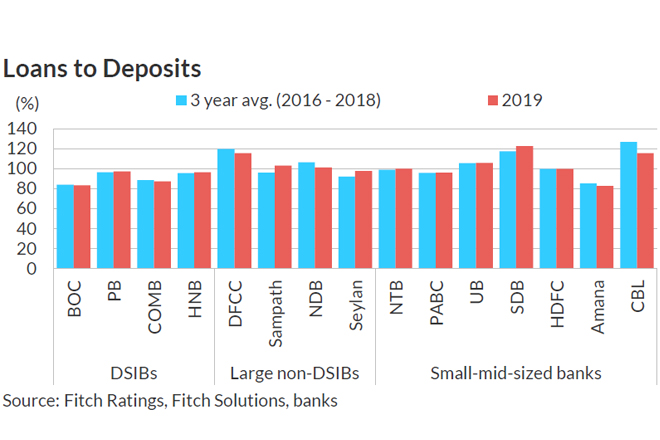Jun 16, 2020 (LBO) – Sri Lankan banks' operating environment and financial profiles ace escalating risks from the economic fallout of the coronavirus.
Fitch Ratings now expects Sri Lanka’s real GDP to contract by 1.
3% in 2020, worsening from our earlier forecast of a 1.0% contraction published 24 April 2020 due to the pandemic.
Deterioration of the economy may worsen if the virus lingers for longer than we expect, the firm said in a new report.
The weakened operating environment will compound the existing threat to the banks' financial profiles through elevated asset quality and earnings pressure although the sector's adequate capital buffers should help it withstand the near-term risks.
Heightened Asset-Quality Risks
We expect asset-quality pressure to manifest from 4Q20 and extend to 2021. The relief measures introduced by the Central Bank of Sri Lanka (CBSL) would delay credit migration for sectors affected by the pandemic in the short term. Nonetheless, we expect underlying asset quality to deteriorate, as most borrowers will not emerge unscathed from the economic downturn.
Coronavirus Exacerbates Earnings Pressure
Sri Lankan banks' operating profit will be negatively affected by pressure on interest margins, a reduction in fee-based income and rising loan-impairment charges in 2020 and 2021. Profitability pressure will also stem from the slowdown in loan growth due to low business confidence and consumer sentiment.
We expect Fitch-rated banks' core earnings metric of operating profit/risk-weighted assets to fall to 2.7% by end-2020 from the current low of 3.
1% at end-2019. However, most of the banks have sufficient pre-impairment profit (PPOP) buffers to absorb increased credit costs without incurring losses.
Capital is Vulnerable to Severe Shocks
Sri Lankan banks have built up capital buffers over the past few years in response to regulatory requirements, which should help them withstand the near-to-medium term pressure.
Fitch-rated banks’ average common equity Tier 1 (CET1) capital ratio improved to 12.
6% by end-2019 from 11.7% at end-2018. Nonetheless, capital impairment risks are high in the event the pandemic’s impact is significantly worse than we expect.
Full report
Fitch-Coronavirus-Compounds-Sri-Lankan-Banks-Stresses-2020-06-15
